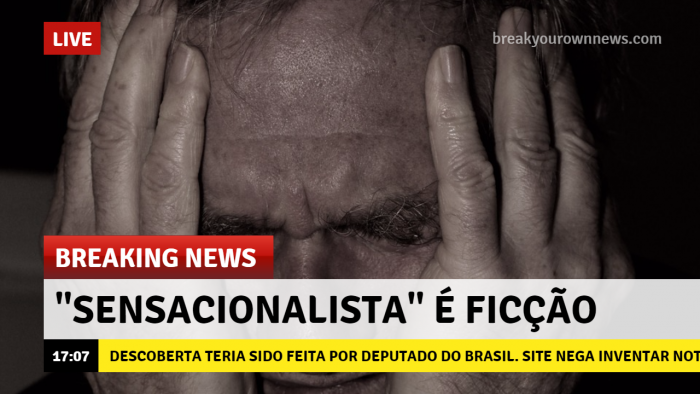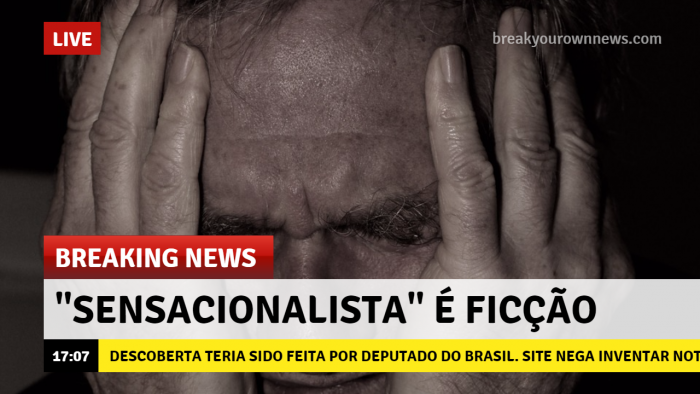
It was a joke, Congressman
“PMDB senator who didn’t have his arrest ordered loses status amongst colleagues”. You probably have seen fake headlines like this made by Sensacionalista, Píaui Herald and Olé do Brasil, fictional “news” websites that joke with commonplaces, clichés and situations usually understood as absurd in the real news. These websites kidnap some space from the “serious” news that populate our feeds, a lot of times reminding us that the “emperor has no clothes”.
Humoristic pages like these are part of a broader process. Over the last few years, the political instability of the country and the massified use of social media has produced boiling (and hilarious) social networks. With each new scandal, a dozen new memes are born, with each minister fired, a bunch of new gifs, with each phase of the Operação Lava-Jato (Operation Car Wash), new forms of political chronic. Political criticism with a humoristic seasoning has never been so spread out — and so acidic.
A politician who did not like at all how he was portrayed by a fake news website was the polemic congressman Marco Feliciano (PSC-SP). The politician said he was offended by the headline “Marco Feliciano cancels shipment of shampoo bought in Miami” (published right after the decision of the American Supreme Court in favor of gay marriage), and went to court against UOL, the provider that hosts the Sensacionalista website. He asked for Justice to order the removal of the “news” in preliminary basis, and to determine the surrender of all data that could identify the author of the text.

From its side, UOL argued that they only hosted the website and did not have the conditions to remove just the referred page (they could only make Sensacionalista unavailable as a whole). According to UOL, a hosting provider is only responsible for “renting” a webpage like Sensacionalista (the real provider of the content) a space in a server, which allows the page to be online. The argument is that Feliciano’s request extrapolates the technical limits of the activity of this “hosting” provider, making UOL responsible for a content they did not make. UOL still used the same argument – of the technical limits – in relation to the identification data of the author of the post, alleging that they did not have how to supply them.
The case was decided by the judge of the 7th Civil Court of Brasília over the last month. The judge determined that UOL should provide the records that allowed to identify the author of the publication, but affirmed that removing the content would be censoring. It is curious that such affirmative was made by the judge, in the decision, right after she realized that Feliciano had requested the removal of the news only in preliminary basis (that is, provisionally and without hearing the other party), and not definitively (that is, in a main process). What was left in the air was if the legislator was not worried about removing from the Internet a content that he considered to “morally shake and torture him” (as stated by him) at the end of the process.
The sentence determined, therefore, that the production of critical humoristic content related to politicians is protected by freedom of speech, but notes that the Federal Constitution would seal the anonymity, which would justify the disclosure of the identification data. As we commented before, the prohibition of the Constitution doesn’t necessarily generate a right of knowing who is on the other side, behind the screen.
Specifically on the Sensacionalista case, it’s worth questioning if their writers would really be trying to use their anonymity to make their criticisms. It’s hard to believe that the producers of humoristic content consolidated such as the responsibles for the page support their business on the idea of not responding for what they post. But there are many cases in which pages like this can benefit from the Internet to make criticisms, complaints and reflections, in a humoristic way or not. At the same time it can serve as tool for masking the author, the Internet also gives power and voice to the citizens.
It’s worth reminding that contents on the Internet are rarely posted in a completely anonymous way. Most of the times, these publications leave traces that allow the identification of the author, but the gathering of this data depends in a legal order that should evaluate, precisely, if there are reasons that justify the author’s exposure. And it should be rigorous. When the Constitution prohibits the anonymity, it doesn’t demand that all people should always be identified: the pseudonymity (to express yourself with fake names) is admitted. That protects the freedom of speech: this blog also recently discussed what public authorities can do when they understand that a journalist “discredits” their work.
In relation to the request for the removal of the content directly directioned to the hosting server, the argument revolves around the “technical limits” of the service. As the locator of the space where the content is hosted, could UOL just disable the access to the addresses of specific content? If so, what are the implications of involving the hosting provider in requests that involve content posted on the Internet?
The Marco Civil da Internet (Brazil’s Internet Bill of Rights) does not specifically mention hosting providers; it only differentiates Internet connection providers (telecom operators) and Internet applications providers (companies that offer their services to those connected to the Internet). So, there are open questions concerning the limits of the responsibility of each of these different services offered online by “providers” that are not necessarily discriminated by law. Hosting seems to be distant from a social networking service or a messaging one, for example. And it is important to note that including the hosting providers in the process of the removal of content means, most of the times, to make decisions about what has to leave and what stays on the Internet without hearing the other side, the author of the posts, which can be important for the freedom of speech. Cases like this are an opportunity for the Judiciary to broaden and refine its understanding about different services and activities, minimizing asymmetries and preventing improper accountabilities.
This sentence is another chapter of the history of new ways of narrating politics in Brazil – and what are its limitations. In 2015, the prosecutor for Congress defended, with the blessing of the then president of the house, a bill that penalized who created fake profiles online, what would have a direct impact on people who kept pages that made fun of the work of public figures.
What is the dimension of the protection of the right to free manifestation of thought in a society when you can’t have freedom to make jokes about the rulers? It seems to be fundamental that the comprehension of such right follows (and protects) new ways of laughing. It’s the way for us not to be mistaken when we see that the emperor has no clothes.
By Dennys Antonialli, Francisco Brito Cruz and Mariana Giorgetti Valente
Translated by Ana Luiza Araujo